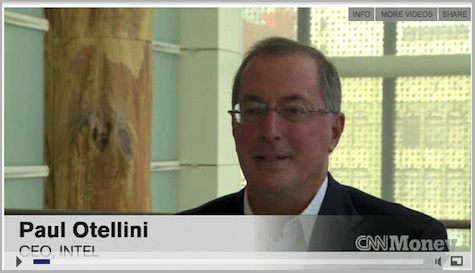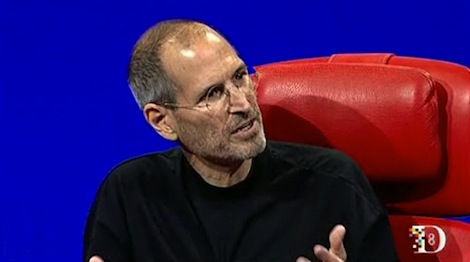-
VideoNuze Report Podcast #124 - Sizing Up Apple's TV Ambitions
I'm pleased to be joined once again by Colin Dixon, senior partner at The Diffusion Group, for the 124th edition of the VideoNuze Report podcast, for Mar. 9, 2012. In this week's podcast we discuss Apple and its TV ambitions.
This past Wednesday Apple announced a few minor feature updates to its $99 Apple TV device. While the device continues to improve, in my view it still does not come close to representing Apple's ultimate ambitions in the living room. I think it's inevitable that Apple will introduce some type of "television" (timing TBD) and that when it does, it will be both a design and an experience breakthrough. My caveat here is that Apple needs quality content to support the device, and what it will be able to offer is still unclear. Stirring the pot, in the past week the NY Post reported that Apple is negotiating for rights to turn channels into apps, and Steve Jobs's biographer said that he purposely left out of his book details of what Jobs thought Apple TV should be.Categories: Aggregators, Devices, Podcasts
-
Cloud Delivery Comes to Apple TV For Purchased TV Programs
Apple has introduced several enhancements to Apple TV that make it easier to access purchased TV programs. With the new software updates, Apple TV users can buy programs (in addition to renting) via Apple TV directly, and those programs will then also be available for complimentary download on other iOS devices. Additionally, it's now also possible to stream previously purchased programs in iTunes from the cloud to Apple TV, obviating the need for local storage. Apple's goals here are to deliver more viewing flexibility for purchased programs, and therefore hopefully to drive more consumption.
Categories: Devices
-
Apple TV Sold Almost 500K Units in Q2, So Maybe There's Still Hope For Google TV?
Last week Google TV got smacked around pretty hard, as Logitech, maker of the standalone Revue device, conceded that returns were running ahead of sales (which has now been updated to reflect returns from distributors, not consumers). The company took a $34 million writedown to cover the cost of reducing Revue's price from $249 to $99. And Logitech's CEO Gerald Quindlen, a big Google TV promoter, was shown the d
oor in the process.
It's tempting to conclude that Google TV is toast. However, a small bit of news that got little attention last week suggests that there may still be hope for Google TV: it turns out that Apple TV sold a very respectable 480K units in Q2, which was 70% higher than a year ago, according to Concord Securities analyst Ming-Chi Kuo. And with the holiday season just ahead, quarterly sales are likely to move still higher, making Apple TV a sleeper hit among connected devices.
Categories: Devices
-
5 Items of Interest for the Week of Sept. 27th
It's Friday and that means that once again VideoNuze is featuring 5-6 interesting online/mobile video industry stories that we weren't able to cover this week. Have a look at them now, or take them with you for weekend reading!
Nielsen Unveils New Online Advertising Measurement
comScore Introduces Digital GRP `Overnights` in AdEffx Campaign Essential
Dueling initiatives from Nielsen and comScore were announced on Monday, aimed at translating online usage into comparable TV ratings information, including reach, frequency and Gross Ratings Points (GRPs). While online video ad buying is ramping up, the tools to measure viewership in a comprehensive way have been lacking. This is one of the main issues holding back content providers from participating in TV Everywhere.
Analyst: Cord-cutting fears overblown
New research shared this week by BTIG analyst Rich Greenfield concludes that less than 8% of the market is actually interested in cord-cutting. The big impediment: losing access to sports and cable programming, which is unlikely to migrate to free over-the-top alternatives. Greenfield's conclusion is that cord-cutting isn't a major threat to pay-TV operators over the next 3-5 years. Notwithstanding the research, another factor I'd point to that could tip cord-cutting the other way is consumers' belt-tightening. Much as nobody wants to lose access to programming, if the price is perceived as too high, they'll make compromises.
Why YouTube Viewers Have ADD and How to Stop It
Abandonment rates for online video have always been a concern, and using new research, Visible Measures CMO Matt Cutler now quantifies the behavior. Expect 20% of the audience to drop out within 10 seconds of hitting play, 33% by the 30 second mark and 44% by 60 seconds in. Pretty sobering data but incredibly important in thinking about content creation and monetization.
Networks Have Sharing Issues With Hulu
Hulu's New Hoop
On the one hand, Hulu's network partners, ABC, NBC and Fox are reportedly pulling back ad inventory that Hulu is allowed to sell, yet on the other, Hulu is reportedly out aggressively selling ads in Hulu Plus, its subscription service. Meanwhile this week Hulu also announced that Hulu Plus will be accessible on both Roku devices and TiVo Premiere, as it continues chasing Netflix in the subscription game.
The New Apple TV Reviewed: It`s All About the Video
Apple TV devices started shipping this week, and reviews began popping up all over the web. This mostly positive review indicates that the user experience is solid, but that content selection is still skimpy. That's no surprise given how few deals Apple has struck to date. Yet to be seen is how Apple TV performs when it can access other iOS apps.Categories: Advertising, Aggregators, Analytics, Broadcasters, Devices
Topics: ABC, Apple TV, comScore, FOX, Hulu, NBC, Nielsen, Visible Measures, YouTube
-
Intel's CEO is Bullish on Google TV, Less So on Apple TV
Intel CEO Paul Otellini is plenty bullish on Google TV. In a short video interview with CNNMoney.com's Poppy Harlow, he praises Google TV's vision, saying that "we're just at the beginning of the smart TV revolution" and that "the holy grail here is a seamless proactive integration of this content." Of course, Otellini has a vested stake in Google TV's success as Intel is supplying its Atom chip to power Google TV.
Otellini is decidedly more bullish on Google TV than he is on Apple TV, though he's cautious in noting that Apple is an Intel customer too. He says that Apple TV is "a streaming device for protected content, and there's a market for that," but quickly adds, "I think there's a bigger market for a deeper integration of the Internet into content." I think he's right on both accounts. It depends on what the user values - an open Internet experience on their TV, or a closed, but easy-to-use way of accessing a high-quality library (not to mention the price for each). There isn't one right answer, yet anyway. See "For Connected Devices, To Browse or Not to Browse - That is the Question" for a deeper discussion.
Categories: Devices, People, Technology
Topics: Apple TV, Google TV, Intel
-
Why Apple Still Doesn't Have a TV Strategy
With the race to bring online video viewing to the TV now in full swing, I've continued to wonder why it is that Apple still doesn't have a TV strategy (or if they have one, why they haven't articulated it). More than 3 years since introducing Apple TV, its only TV-related product, Steve Jobs still routinely calls it a "hobby" and there has been virtually no innovation around it. Unsurprisingly, its sales have languished.
Asked at the D8 conference last week when Apple is going to do something in the TV arena, Jobs replied that the "problem with innovation in the TV industry is the go-to-market strategy. There's a subsidized business model that gives everybody a set-top box for free or for $10/month - and that pretty much squashes any opportunity for innovation because nobody's willing to buy a set-top box." As a result he said, "all you can do is add a box on" and that this brings "a table full of remotes, cluster of boxes and bunch of different UIs." Jobs asserted that the only way things will change is to "go back to square one and tear up the set-top box and redesign it from scratch."
Of course, there is virtually no chance that cable/satellite/telco-provided set-top boxes are going away any time soon, which, given Jobs's definition of the problem, will leave Apple on the outside looking in as consumers hunger to view online video on their TVs. From my perspective there are at least 3 reasons Apple appears stymied.
Categories: Devices
Topics: Apple, Apple TV, Google
-
YouTube: "Over-the-Top's" Best Friend
The announcement a couple of weeks ago that YouTube was partnering with TiVo got me to thinking that YouTube is probably the best friend that so called "over-the-top" or "cable bypass" aspirants could have.
As a quick refresher, "over-the-top" and "cable bypass" refer to the emerging category of devices and service providers seeking to bring broadband video to the consumer's TV, but without the involvement of existing video providers such as cable and satellite. Some of these efforts (Apple TV, Vudu and Internet-enabled TVs) are positioned as augmenting incumbent providers, while some (Building B, others) are meant to compete directly.
Today's players share the common trait of being closed, "walled gardens," offering only certain content that they select. This contrasts with the open Internet/broadband model, where users are able to access any content they choose. Many of you know that I have been a strong proponent that open is the winning competitive path for aspiring over-the-top players.
If the over-the-top crowd adopts the open approach, YouTube is their perfect ally; it is the best-known brand name in broadband video, has the largest library of both user-generated and increasingly premium
 video and has huge loyalty. Positioned properly it could be a killer value proposition for over-the-top players. I've previously argued that Apple missed the boat by not adopting this positioning for Apple TV.
video and has huge loyalty. Positioned properly it could be a killer value proposition for over-the-top players. I've previously argued that Apple missed the boat by not adopting this positioning for Apple TV.I talked last week with David Eun, VP of content partnerships at Google and Chris Maxcy, head of biz dev for YouTube, and they both made clear that the goal is to morph YouTube from a consumer destination site to a full-fledged video platform distributing video everywhere - devices, mobile, web sites, others. To this end, YouTube recently published an expanded set of APIs to allow 3rd parties to gain easier access to YouTube's content. This of course is great news for over-the-top devices, who should have considerable flexibility for how to incorporate YouTube into their offering. For now TiVo is leading the way in offering YouTube, albeit to a very small audience.
If you were wondering whether YouTube or Google itself will enter the device business, that seems unlikely. David and Chris were clear in saying that devices are not their core competency, and they'll leave it to others to decide how to implement the YouTube APIs and create and test various user experiences. Meanwhile with more premium content flowing into YouTube, its value as an over-the-top partner only increases.
What do you think? Post a comment!
Categories: Aggregators, Devices
Topics: Apple, Apple TV, Google, TiVo, VUDU, YouTube
-
Hurray for TiVo-YouTube
Hurray for TiVo and YouTube, which yesterday announced a partnership to allow certain TiVo users to watch YouTube videos on their TVs. While the actual number of homes which have the right TiVo model
 and have it connected to broadband numbers under a million, TiVo-YouTube shows there is still hope that the worlds of broadband video and TV will indeed converge.
and have it connected to broadband numbers under a million, TiVo-YouTube shows there is still hope that the worlds of broadband video and TV will indeed converge.Some of you will remember that in December '07 I wrote a post entitled "Broadband Video on TV is a Mirage" in which regrettably concluded that the mass availability of broadband video on TVs was nowhere on the horizon. In that post I wrote:
"The minority of consumers who will actually see broadband video on their TVs will either (1) shell out big bucks to buy a broadband appliance such as Vudu or Apple TV, (2) tackle the challenge of connecting their TVs via wireless networks (3) use a device built for another primary purpose, such as Xbox 360 or TiVo, to selectively augment their viewing with broadband-delivered choices or (4) use a service provider that has decided to throw in a few morsels of broadband video."
With the YouTube deal, TiVo continues to deliver on option 3, augmenting an already impressive array of broadband video available on select TiVo models. TiVo enhances its overall reputation for innovation
 (although still absent resounding market success or profitability), with a particular focus on broadband video. TiVo has previously offered up Amazon Unbox, TiVoCast, Music Choice, Home Movies, etc. Providing access to YouTube, the world's most popular video site, is another notable accomplishment for TiVo.
(although still absent resounding market success or profitability), with a particular focus on broadband video. TiVo has previously offered up Amazon Unbox, TiVoCast, Music Choice, Home Movies, etc. Providing access to YouTube, the world's most popular video site, is another notable accomplishment for TiVo.I continue to believe that whichever company cracks the code on how to deliver wide open broadband video access to the TV - coupled with a strong user experience - is going to hit it big. At the risk of looking too far backward, at the end of 2006 I conjectured that Apple's then still-to-be-launched Apple TV product could be a resounding success if it got the content strategy right (i.e. offering open broadband access and even focusing particularly on easy YouTube access through the device). Instead Apple TV has turned into yet another walled garden and to date has been a market failure. Apple continues to miss the open broadband market opportunity which is sitting right in front of it with a big bulls-eye plainly visible.
The TiVo-YouTube partnership will hopefully have the effect of accelerating the wake up call to other market participants that this gigantic opportunity awaits. Broadband video to the TV is a natural. It simply extends the cable/satellite model of the last 30 years: offering ever more video choices right to the TV.
As I've often said, as amazing as the growth curve has been for broadband video consumption over the last 5 years, even more amazing is that virtually all of this consumption has happened on the computer - a completely parallel world to the traditional TV viewing platform. Nobody could have imagined this level of consumer adoption for a non-TV viewing platform. So then look forward and imagine the possibilities when broadband video and the TV are fused for the masses.
Categories: Devices, Partnerships
Topics: Apple, Apple TV, TiVo, YouTube
-
Vudu Cuts Price
Some of you may have noticed that Vudu announced last Thursday that it was cutting the price of its box by over $100 to $295. I recently wrote about Vudu in "Apple TV Improves, Vudu in its Crosshairs." Looks like it didn't take long for Vudu to start feeling Apple's heat. It's a good move, but I still remain skeptical about this box's mass appeal.
Categories: Devices
-
Apple TV Improves, Vudu is In its Crosshairs
As widely expected, yesterday Apple launched movie rentals in iTunes, with titles from all the major studios. Steve Jobs also announced price cuts and a number of key enhancements to Apple TV, squarely repositioning the device as a "broadband movies appliance" (my term). Apple TV now allows direct ordering (no computer needed) and a much improved UI prominently featuring movies. The message from Apple is
 clear: the primary value proposition for Apple TV's prospective buyers is convenient movie rentals through iTunes.
clear: the primary value proposition for Apple TV's prospective buyers is convenient movie rentals through iTunes. In the last few weeks there has been much buzzing about which companies might feel the most competitive pressure from Apple's launch of movie rentals. Here's how I see it: when rentals are combined with Apple TV's new features, the company that has to be waking up this morning most nervous about Apple's news yesterday is Vudu, because it has the most obviously similar value proposition.
Some of you may not be familiar with Vudu. It is a recently launched combination online movie/TV on demand service and companion box that has gained a lot of favorable early reviews. The company is backed by Benchmark and Greylock, two huge and highly regarded venture firms. While any startup faces long odds of success, with Vudu now going up against the Apple branding and marketing juggernaut, Vudu's odds
 seem even more daunting. In fact, one wonders how the folks at Benchmark and Greylock, when considering their original Vudu investment, weighed the very question of Apple's entry into this market, as it was somewhat inevitable.
seem even more daunting. In fact, one wonders how the folks at Benchmark and Greylock, when considering their original Vudu investment, weighed the very question of Apple's entry into this market, as it was somewhat inevitable.To step back for a moment, as many of you know, I'm skeptical about all appliances meant to bridge the broadband and TV worlds, as I think they have only narrow consumer appeal and create new inconveniences. Apple TV and Vudu are even more specifically-directed at people who are focused on premium movie and TV content, not gaining access to the wider world of broadband video (note Apple TV does provide some access to YouTube videos and podcasts). In effect, purchasers of either of these products value the instant viewing gratification they offer more than the selection, portability, unlimited viewing windows and "extras" that DVDs provide. And of course there are a broad array of choices and models for accessing DVDs (e.g. Netflix, Blockbuster, Wal-Mart, etc.).
However, for interested buyers, my sense is that both Apple TV and Vudu do an admirable job at delivering online movies and TV programs. The issue is that, if I was considering a purchase, and was obviously only going to buy one, I'd be hard-pressed to see why I'd pick Vudu over Apple TV. Consider: Apple TV is cheaper ($329 vs $399 for Vudu, albeit with smaller storage space), provides access to your music library and podcasts already configured in iTunes, allows easy display of your photos, has a familiar iPod/iTunes UI and enables transfers to these devices for portable viewing. Apple TV is also backed by a strong and well-known brand, giving additional comfort that the company will be around for a long time to come, which is always a nagging question when buying anything from a startup.
The whole category of broadband movie appliances is going to remain pretty small until the key limitations are resolved (small selection, 24 hour playback, 30-day expiration, no portability, no "extras", etc.). When these are fully addressed, online delivery of movies and TV programs will happen in a big way, no question.
So for now, given these limitations, what we're really seeing is a skirmish for positioning and branding, with an eye toward the long-term win. This dynamic in particular gives Apple, as a multi-billion dollar diversified company, yet another a big advantage over a single product startup. I've learned never to count out plucky startups, but given Apple TV's new positioning plus rentals, the mountain Vudu is trying to climb just got a whole lot more treacherous.
What do you think? Post a comment and let everyone know!
Categories: Aggregators, Devices, FIlms
Topics: Apple, Apple TV, iTunes, VUDU
-
Broadband Video on TV is a Mirage
In yesterday's WSJ, Nick Wingfield wrote a lengthy article outlining the 5 key challenges encountered by the myriad devices aimed at bringing broadband video to TVs. He lists them as: consumer resistance to adding another box, complications in setting them up, cost, lack of content and slow downloads.
The article has a generally optimistic tone, posing "solutions" to each of the challenges. You're left with the impression that mass-scale broadband video on TV could actually happen sometime soon.
At the risk of being the "skunk at the picnic," I have recently come to believe that broadband video on TVs is a mirage, tantalizingly close yet in reality nowhere on the horizon. Unless there is some new box or approach I've yet to hear about, I've regrettably concluded that broadband video will be tied to computers, and select mobile devices, for a long time to come.
The minority of consumers who will actually see broadband video on their TVs will either (1) shell out big bucks to buy a broadband appliance such as Vudu or Apple TV, (2) tackle the challenge of connecting their TVs via wireless networks (3) use a device built for another primary purpose, such as Xbox 360 or TiVo, to selectively augment their viewing with broadband-delivered choices or (4) use a service provider that has decided to throw in a few morsels of broadband video.
Those of you with good memories will remember that in a Broadband Directions newsletter at the end of 2007 I wrote bullishly about Apple TV's ability to become the breakout convergence device, if only Apple opened up the box to all broadband content. Instead Apple has kept the box closed, available for iTunes downloads and selected YouTube videos. Consequently it has been a flop.
To help explain why products succeed or not, I tend to reach for Prof. Clayton Christensen's abiding lesson that people "hire" products to do "jobs" they have to be done. In other words, products that meet the buyer's true desires are the ones that succeed.
For me, the "job" that consumers increasingly want "done" is to be presented with an integrated, easy-to-access service (not just a new box) that offers all video programming they value in an on-demand manner and priced appropriately. That's a tall order, but ultimately one which will drive wide-spread success of any new product in this space.
Some of the possibilities include TiVo, which believes in this "seamless" philosophy, though it is still dependent on current service providers (cable, satellite, telco) to deliver programming. ICTV has a very interesting approach, though it is also reliant on existing service providers. Building B is taking a bold approach that seems to meet the full test for success, though it's still too early to know whether they can successfully execute on their vision.
But hodge-podge, costly broadband appliances just create new inconveniences while only partially addressing true consumer needs. As a result, they're not going to find a broad market. And so, barring some other new innovation, most of the world will still be watching broadband video on their computers and some mobile devices for a long time to come.
Categories: Devices
Topics: Apple, Apple TV, Building B, ICTV, TiVo, VUDU
Posts for 'Apple TV'
Previous |


